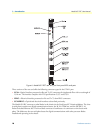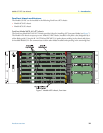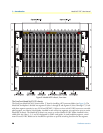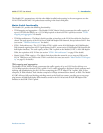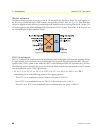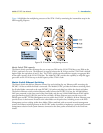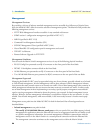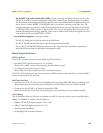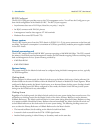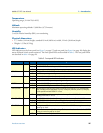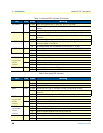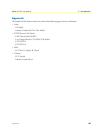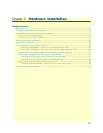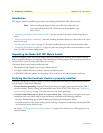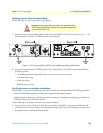
1 • Introduction Model 6511RC User Manual
26 Hardware overview
RS-232 Config port
The RS-232 Config port provides access to the CLI management service. You will use the Config port to per-
form initial configuration of the Model 6511RC. The RS-232 port supports:
• Asynchronous data rates of 19.2 kbps, 8 data bits, no parity, 1 stop bit.
• An RJ-45 connector with EIA-561 pinouts
• A management interface that supports VT-100 terminals
• Hardware flow control (RTS and CTS)
Power system
The 6511RC obtains power from the CPCI chassis via PCMG 2.11 47-pin power connectors on the front and
rear blade. Total power consumption is a maximum of 43 Watts, provided by modular power supplies installed
in the cPCI chassis.
Central processing unit
The 6511RC employs an Intel i960VH RISC processor operating at 100 MHz/100 Mips. The CPU controls
the memory, front/back-panel and management interface for DS0 timeslot mapping, Ethernet switching, loop-
back and management services. System memory provided by:
• 4 MB Flash ROM
• 8 MB EDO DRAM
System timing
The system timing for the Matrix Switch must be configured using the blade’s management services, typically
via Web Management.
Clocking Mode
When configured in Master mode, the Matrix Switch serves as the Master clock source (timing reference) for
all other blades on the same H.100 bus within the Model 6476 chassis or Model 6676 chassis segment. When
configured in Backup mode, the Matrix Switch serves as an alternate Master clocking source (backup) should
the Master clocking source fail. When configured in Slave mode, the Matrix Switch will not provide system
timing over the H.100 bus for any other blades.
Clocking Source
Regardless of its clocking mode, the Matrix Switch can derive its own system timing from several sources. You
will define two clocking sources for the Matrix Switch, a first-choice (Primary Reference) and an alternate
(Fallback Reference). The Matrix switch will derive its own system timing from the Primary Reference as long
as it remains available. Should the Primary Reference become unavailable, the Matrix Switch will switch over
to the Fallback reference as the clock source for its own system timing. The following clocking sources can
serve as either the Primary Reference or Fallback Reference for the Matrix Switch:
• The internal oscillator (clock) residing on the Matrix Switch front blade
• A network clock recovered from the STM-1 SDH signal stream
• Another blade operating in either Primary or Secondary mode on the same bus.



